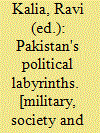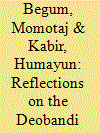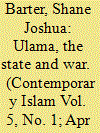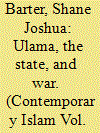|
|
|
Sort Order |
|
|
|
Items / Page
|
|
|
|
|
|
|
| Srl | Item |
| 1 |
ID:
141016


|
|
|
|
|
| Publication |
New Delhi, Routledge, 2016.
|
| Description |
xi, 197p.hbk
|
| Standard Number |
9781138191402
|
|
|
|
|
|
|
|
|
|
|
|
Copies: C:1/I:0,R:0,Q:0
Circulation
| Accession# | Call# | Current Location | Status | Policy | Location |
| 058318 | 303.62505491/KAL 058318 | Main | On Shelf | General | |
|
|
|
|
| 2 |
ID:
114015


|
|
|
|
|
| Publication |
2012.
|
| Summary/Abstract |
During the British Raj, as part of an effort to reform the Muslim community through religious regeneration and in the absence of Muslim political power on the subcontinent, Islamic scholars (ulema) from the Darul Uloom Deoband seminary urged the setting up of separate institutions of religious education for Muslim women. The reformist discourse of the Deobandi ulema had, and still has, a profound influence on the pedagogy of madrasah education for women in South Asia, including Bangladesh. This study examines how Deobandi reformist ideals continue to be reflected in a non-government female madrasah in Bangladesh. The study provides an ethnographic account which illustrates the development of a sense of Muslim womanhood, rooted in ideas of moral guidance and the pious lifestyles of the female students of the madrasah. Madrasah education increases Muslim women's participation in religious institutions and forums, thereby heightening the possibility of a broader impact on religious life. Although madrasah education empowers female students to improve their religious consciousness, it has less impact on patriarchal ideology, which is deeply embedded in Bangladeshi society and culture.
|
|
|
|
|
|
|
|
|
|
|
|
|
|
|
|
| 3 |
ID:
102878


|
|
|
| 4 |
ID:
102933


|
|
|
|
|
| Publication |
2011.
|
| Summary/Abstract |
In recent years, much has been said of the relationship between the headmasters of Islamic boarding schools (ulama), the state, and war. Hoping to clarify how ulama behave in times of war and why they react as they do, I look to the recent secessionist conflict in Aceh, Indonesia. Based on extensive village fieldwork, I find that in response to the conflict, Aceh's ulama were divided; some supported the rebels, some supported the state, and some remained neutral. These positions were largely predicted by combatant control, a pragmatic response to conflict dynamics. Sub-regional comparisons, temporal comparisons, and interviews suggest that while many ulama sided with power, they also sided against human rights abuses, a concern for social justice which may be rooted in religious sentiment after all.
|
|
|
|
|
|
|
|
|
|
|
|
|
|
|
|
|
|
|
|
|